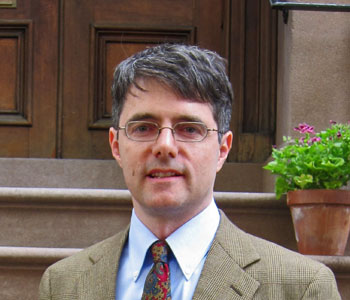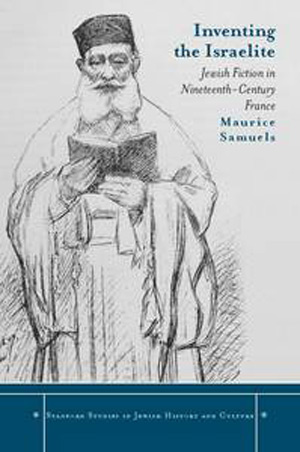
In 1790-91, France became the first European country to make the Jews full and equal citizens. Considered a backward population in need of “regeneration” by Enlightenment reformers, the French Jews transformed over the course of the next hundred years into a modernizing vanguard, spearheading many of the social, economic, and political changes that helped make Paris into the “capital of the nineteenth century.”
Inventing the Israelite examines the fiction produced in the mid-nineteenth century (1830-1870) by the first generation of Jews to be born as French citizens. These writers include Eugénie Foa, Ben-Lévi (pseud. Godchaux Weil), Ben Baruch (pseud. Alexandre Créhange), Alexandre Weill, Daniel Stauben (pseud. Auguste Widal), and David Schornstein. Mostly unknown to scholars, their novels and short stories provide unique insight into a community in the throes of momentous change.
I argue that these nineteenth-century French Jewish writers used fiction to come to terms with the possibilities—and pitfalls—presented by emancipation, and as a kind of laboratory for the invention of modern Jewish identity. They did so by bringing the forms of the French literary tradition to bear on the central problems facing modern Jews. The result is unique in both French and Jewish literary history.
My book begins with an introduction that outlines modern French Jewish history and explains the factors—including early emancipation—that made the French Jews unique among their European coreligionists. The core of Inventing the Israelite is five chapters, each centered on a writer who epitomizes a different point on the Jewish ideological spectrum of the time—a different answer to the problem of how to be Jewish in modern France.
These answers range from apostasy to orthodoxy, from advocating intermarriage and conversion to maintaining strict adherence to Jewish laws and traditions. In between these two extremes, other writers advocate through their fiction for religious reform as well as for more idiosyncratic ways of becoming a modern Jew. Still others sought to redefine Jewishness in secular terms, leaving behind religious practice for a more historical form of identity.
In the conclusion, I skip forward to the early twentieth century to show how the fiction of Marcel Proust perpetuates the legacy of these nineteenth-century Jewish writers by asking very similar questions about what it means to be a Jew in modern France.
“The fiction of Marcel Proust perpetuates the legacy of nineteenth-century Jewish writers by asking very similar questions about what it means to be a Jew in modern France.”
Nineteenth-century French Jews have often received bad press. Denounced by antisemites at the time as the new feudal lords of capitalism, they were also seen as nefarious agents of communist revolution.
But more damning—because less preposterous—criticisms have come from other Jews. Indeed, twentieth-century Jewish historians often characterized nineteenth-century French Jews as misguided apostles of assimilation.
In The Origins of Totalitarianism, for example, Hannah Arendt criticizes the French Jews for having renounced their Jewish identity in a bid to become French and for having been woefully unprepared to deal with the difficulties of the Dreyfus Affair and the Vichy period as a result.
I decided to examine the fiction produced by the nineteenth-century French Jews to test the truth of these stereotypes. I quickly discovered, however, that most scholars did not believe that such a literature existed.
One recent textbook that I consulted declared that there was no French Jewish literature to speak of before the Dreyfus Affair at the end of the nineteenth century. Before this period, French Jews had apparently been too busy with their social integration and economic advancement to write.
And yet, while researching my last book, on historical representation in nineteenth-century France, I came across a historical novel entitled La Juive (The Jewess) published in 1835 by a Jewish woman from Bordeaux named Eugénie Foa. Written in the descriptive style of Walter Scott, this melodramatic page-turner, set in eighteenth-century Paris, tells the story of a Jewish woman who falls in love with a handsome Christian nobleman and dies as a result of her illicit passion.
This novel fascinated me because of the way it used the popular generic forms of the historical and sentimental novel to confront the central problems of Jewish modernity, including intermarriage, conversion, and the conflict between personal freedom and Jewish tradition. Here, it seemed, lay evidence that a French Jew of the early nineteenth century in fact had made an attempt at writing fiction about the Jewish experience. But did Foa represent a lone case?
When I began to read the new French Jewish press of the period, especially the two major monthly Jewish newspapers founded in the early 1840s, Les Archives Israélites and L’Univers Israélite, I realized that Foa had in fact inaugurated a trend. These newspapers, which continued to thrive until World War II, published a great deal of writing in many genres, all depicting Jews. They also published reviews of other works, including much fiction. After locating these works at the Bibliothèque Nationale in Paris, I was finally convinced that something like a French Jewish literary sphere existed in the nineteenth century.
The period I researched (1830-1870), spanning the July Monarchy, the Second Republic, and the Second Empire, represents the point at which French Jews’ faith in the path of emancipation was at its highest level, following the fall of the conservative Restoration monarchy and prior to the outbreak of fin-de-siècle antisemitism.
As I show, even in this period, most French Jews resisted the temptations of assimilation—if by “assimilation” one means the renunciation of all Jewish specificity in the rush to integrate completely with the dominant culture. Indeed, the very fact of their publishing fiction about Jews reflects a willingness to assert their Jewishness in the public sphere. This is true even of Eugénie Foa, who advocates intermarriage and conversion, but who nevertheless attempted to carve a place for herself in the crowded literary marketplace as France’s first Jewish writer.
Chapter two of the book focuses on the writer Ben-Lévi (the pseudonym of Godchaux Weil, 1806-1878) who published a dozen short stories, as well as many non-fiction pieces, in the reform Jewish newspaper, Les Archives Israélites, in the 1840s. Originally from Alsace, Weil’s father was a prosperous porcelain manufacturer and a leader of the Parisian Jewish community. His nephew was perhaps the most famous of all modern French writers—Marcel Proust.
Written entirely in French, the articles in Les Archives Israélites targeted an acculturated, elite readership, eager to modify Jewish religious practice and tradition in order more fully to embrace the opportunities offered to them by France’s revolutionary granting of citizenship.
Ben-Lévi’s fiction theorizes the nature of this transition, extolling the advantages of emancipation while exhorting readers to remain loyal to a newly modernized Judaism. Written in the new descriptive style of Balzac that critics at the time were beginning to label “realist,” Ben-Lévi’s stories stand out from the other articles in the newspaper, which tend to flatter the ethnic pride of the community, by asking readers to contemplate what they have left behind in their social ascent.
One story from 1841 entitled “The Rise and Fall of a Polish Taleth,” narrates the adventures of a prayer shawl as it gets handed down through three generations of a Parisian Jewish family. The story opens in the 1780s, as the very orthodox Père Jacob, an iron dealer, imports a taleth from Poland for his wedding. Upon his death, the prayer shawl passes to his son Jacobi, an officer in Napoleon’s army, who is “much less religious” than his father but nevertheless venerates the taleth as a link to family tradition. By the time it reaches Jacobi’s son, a fashionable French gentleman who calls himself Jacoubé “in order to dissimulate entirely his israelite origin,” the taleth has become a mere piece of cloth, devoid of both familial and religious significance. At the end of the story, we learn that Jacoubé has given it to a prostitute to wear to a costume ball.
Whereas the taleth story functions as a modern parable criticizing the losses entailed by the assimilation process, Ben-Lévi holds out hope in his other stories for a renewed appreciation of the Jewish tradition. In a story from 1846, called “The Fish and the Breadcrumbs,” an assimilated skeptic named Gustave learns to respect the Jewish religion by watching a widow comfort her young son through the performance of a religious ritual. The spiritual awakening of Ben-Lévi’s character has little to do with the supernatural or with God as such, but rather with a new understanding of the way Jewish tradition forges ethical bonds linking human beings in spite of the pressures of capitalist modernity.
In the conclusion to the book, I ask how the rediscovery of Ben-Lévi’s fiction might help us to understand what his much more famous great-nephew, Marcel Proust, had to say about Jews and Judaism. I show how both writers ask very similar questions about what it means to be a Jew in the absence of religious faith, inherited tradition, or legal strictures. I suggest that Proust’s character Swann, an assimilated Jew who “returns to the spiritual fold of his fathers” as a result of the Dreyfus Affair, becomes a kind of modern(ist) version of Gustave, Ben-Lévi’s reformed cynic.
“Nineteenth-century French universalism was far less monolithic and hegemonic, far more malleable and adaptable, than has previously been supposed.”
Taken together, this fiction helps us reconsider what we thought we knew about Jewish history and literature. It reveals that nineteenth-century French Jews envisioned other fates for themselves besides assimilation and homogenization. In the mid-nineteenth century, at a time when French Jews were first beginning to take advantage of the new opportunities offered to them, they sought out creative ways to become French while remaining Jews and to express their difference in the public sphere.
This literature also helps us reconsider what we thought we knew about French history and literature. These writers were very likely the first members of a minority religious or ethnic group in France to describe that group’s experience in fiction. They thus reveal that difference inhabited modern French literature from the start, and provide a useful historical context for examining current examples of minority or postcolonial fiction, which concerns itself with very similar issues.
Moreover, these Jewish writers help us re-evaluate the tradition of French universalism, which is often seen as hostile to all forms of minority identity. By showing how these Jewish writers attempted to reconcile their particular identities with the French universalist tradition, or to substitute a Jewish form of the universal in place of what they felt to be the Christian one of the dominant culture, I indicate that nineteenth-century French universalism was far less monolithic and hegemonic, far more malleable and adaptable, than has previously been supposed.
The recent “return of religion” in France has made these issues newly topical. The last few decades have seen fierce clashes over the role of religion in contemporary society, as France has struggled to accommodate the increasingly vocal demands of its religious (and ethnic) minorities. The 1989 “Affaire des foulards,” or head-scarf controversy, in which French Muslim girls fought unsuccessfully for the right to wear head coverings in public schools, demonstrates how fraught the question of laïcisation continues to be in France.
While I do not address such recent issues in my book, it is my hope that the nineteenth-century debates around Jews and Judaism will provide a useful historical context for understanding current controversies.


Maurice Samuels is Professor of French at Yale University. He was born in Chicago and received his Ph.D. from Harvard University. In addition to Inventing the Israelite: Jewish Fiction in Nineteenth-Century France, featured in his Rorotoko interview, he is the author of The Spectacular Past: Popular History and the Novel in Nineteenth-Century France (Cornell, 2004). His Nineteenth-Century Jewish Literature Reader (Stanford, forthcoming 2011), co-edited with Jonathan Hess and Nadia Valman, will feature many of the novels and short stories discussed in Inventing the Israelite in his own translations. Currently, Samuels is working on French Philosemitism, or positive discourse on Jews, from the Revolution to the present.